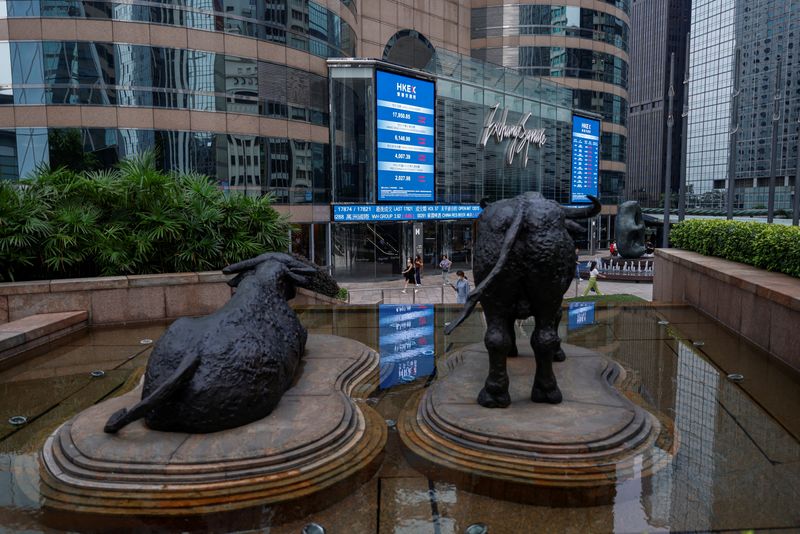Amanda Cooper
LONDON (Reuters) – Global stocks hit record highs on Wednesday, driven by a rally in technology shares that helped make AI chipmaker Nvidia the world's most valuable company, while the dollar stagnated after weak U.S. retail sales data suggested interest rates could fall this year.
The MSCI world stock index rose 0.2% to 805.13, having traded at a record high of 805.43.
An overnight surge in Wall Street tech stocks, which saw Nvidia overtake Microsoft as the world's most valuable company, continued during Asian trading hours, with regional tech shares up 2% to record highs.
U.S. stock index futures also rose, with the tech-heavy Nasdaq 100 up 0.2% and the S&P 500 up 0.1%. In Europe, the STOXX 600 was flat.
The pound rose slightly after data showed that UK inflation returned to the Bank of England's 2% target in May for the first time since 2021.
While the fall in inflation would be welcomed by both Chancellor Rishi Sunak and the Bank of England, it is likely to come too late to turn around Sunak's fortunes in next month's general election or prompt the Bank of England to cut interest rates on Thursday.
“UK inflation is 2% and US inflation is 2.7% PCE so this is hardly disruptive,” Lombard Odier economist Sammy Char said of the Fed's preferred inflation measure, the personal consumption expenditures index.
“It lends credibility to the idea that the Bank of England will act no later than August, followed by the Fed in September,” he said.
The pound, which has fallen about 0.2% so far this month, was last up 0.1% to $1.2722, while the euro was little changed at $1.073 but is still down 1% in June.
The European single currency is under pressure after French President Emmanuel Macron called for early general elections following a crushing defeat for the ruling centrist party to the far right in European Parliament elections.
U.S. markets are closed on Wednesday, so trading is expected to be slow throughout the day.
Expectations of interest rate cut
U.S. retail sales barely grew in May and the previous month's figure was revised sharply downward, data showed on Tuesday, suggesting economic activity remained sluggish in the second quarter.
The data helped push expectations of a September rate cut up slightly, with traders now pricing in a 67% chance of a cut, up from 61% a day earlier, CME FedWatch showed. The market is pricing in a 48 basis point cut this year.
“The Fed will need more data to support its case for a rate cut and investors should not overreact to one or two pieces of data,” said Basu Menon, managing director of investment strategy at OCBC.
The story continues
In response to modest U.S. inflation data last week, Fed officials struck a generally more hawkish tone, lowering their previous median forecast of three quarter-point rate cuts this year to one.
“While 2025 is the more likely scenario for a rate cut, the uncertainty over 2024 remains ok as expectations of bigger rate cuts over the next two years will continue to support the market,” Menon said.
Fed officials are cautiously steering their policy, awaiting further evidence that inflation is slowing and warning signs from a still-strong labor market, upending widespread expectations of one or two rate cuts by the end of the year.
The Dollar Index, which gauges the greenback's performance against six other currencies, was in positive territory at 105.30.
The yen edged up and the dollar fell 0.1 percent to 157.70 yen, near last week's six-week high.
Over the past four and a half years, the yen has lost a third of its value against the dollar, largely due to the large interest rate differential between Japan and the United States.
Minutes of the Bank of Japan's April policy meeting showed policymakers discussed the impact of a weaker yen on prices, with some suggesting they might raise interest rates sooner than expected if inflation exceeded expectations.
In commodity markets, crude oil prices fell, with Brent crude futures down 0.1% to $85.07 a barrel and U.S. West Texas Intermediate crude down 0.3% to $81.35.
(Additional reporting by Ankur Banerjee in Singapore; Editing by Jamie Freed, Jacqueline Wong and Alex Richardson)



